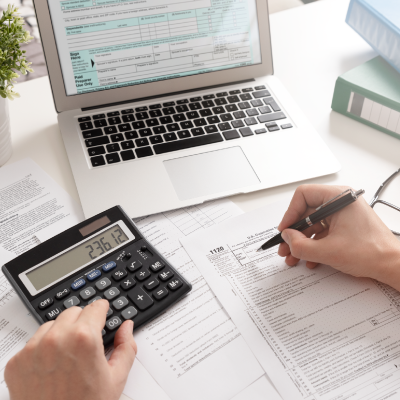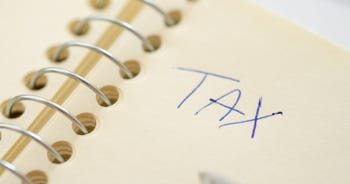How do I pay myself as a small business owner?
As a business owner, keeping things ticking over should always be your number one priority.
Sure, we may all want to be the next Jeff Bezos or Elon Musk, but the unfortunate truth is that, as a business owner, your own pay packet is last on the list of priorities.
Only once things are running like clockwork - your rent is up to date and staff are being paid on time - can you even begin to think about paying yourself.
But how much should that pay packet be?
Is it right to pay yourself just enough to get by, so you can keep as much as possible in the coffers for a rainy day? Or do you deserve an executive wage as a reward for getting things off the ground?
The sensible approach would be to keep your wage to a bare minimum until your business is at least turning a profit. But, even once you reach this stage, what’s a fair wage for your time and efforts?

How much should I pay myself?
As all businesses are unique and business owners’ circumstances differ, this is a hard question to answer with definitive figures, but we’ll try to at least give you a rough idea.
On the one hand, the amount you pay yourself should come down to your business and its circumstances - taking into account factors such as the industry you operate in, your business model, and your turnover.
Ultimately, you should aim to strike a balance between investment in your business, and paying yourself a wage. Entrepreneurs will often take a basic wage to simply cover living expenses in the early days, as this is a way to ensure the business has maximum investment while reducing the amount of start-up capital needed.
To do this, you need to work out your basic worth, and this can be done by following the steps below.
How to work out your basic worth
- Take your basic worth (the minimum you want to make when going into business).
- Divide it by 12.
- Multiply the rate of inflation by 4.
- This gives you the % to add to your monthly income.
For example*:
- Basic worth = £25,000
- Monthly wage = £2166.66
- Inflation rate = 4% x 4 = 16%
- New monthly wage = £2166.66 + 16% = £2512.66
- New yearly wage = £2512.66 x 12 = £30,151.92
Unfortunately, it’s not enough to simply break even, and your priority should be to make sure that your business is financially stable.
When can I increase my salary?
Again, every business is different, so there is no one size fits all answer to this question. The obvious answer would probably be that you can increase your salary when your business breaks even, but even this comes with some caveats.
It’s not enough to simply break even, and your priority should be to make sure that your business is financially stable. This is because every inflated overhead will impact the overall cash flow of your business. This means that paying yourself more when it's not financially robust enough can harm growth.
To avoid this happening to your business, it can help to tie your salary in with your business’s growth.
How to tie your salary into your business’s growth
If your business grows by 5% over a quarter, then reward yourself with a quarterly wage bonus of the same amount, as below:
- Take your monthly wage.
- Multiply it by 3 (number of months in a quarter).
- Work out your bonus % based on the growth % of your business against your quarterly wage.
For example*:
- Monthly wage = £2512.66
- Quarterly wage = £2512.66 x 3 = £7537.98
- Bonus for the quarter = 5% of £7537.98 = £376.89
*Please note: There are several ways that you can arrive at a figure when working out how much you should pay yourself. The above are simply suggested methods.
You should then reassess your salary annually, based on the growth and performance of your business. But, above all, remember to be realistic with your wage, and make sure it’s financially sustainable for your business.
If your business is paying inflated overheads, it’s worth looking at your business essentials - the tech-enabled team at Bionic can help cut your commercial energy bills and find a great deal on business phone and broadband. To see how much you could save, enter your business postcode at Bionic.co.uk.
How do I pay myself as a business owner?
There are two main ways you can pay yourself as a business owner - through business drawings or a salary. The method you choose will depend upon whether you're a sole trader or you run a limited company.
How do I pay myself as a sole trader?
If you’re a sole trader, then all profit earned is yours. Using this money is classed as “business drawings”, and is different from taking a wage. On the downside, you are personally liable (you have unlimited liability) for your tax bills, so you need to make sure that you properly record any drawings you take from the business.
If you don’t pay your tax, HMRC will come for your personal assets. Remember, the money you withdraw from your business is not taxable – but your profit, or income, is.
If you are a sole trader, it could be worth setting up a separate tax savings bank account and aiming to deposit up to 25% of all net income. Then, at the end of the tax year, you'll pay a self-assessment bill. You should speak with your accountant on whether you need to have another bank account for your VAT.
What are the advantages and disadvantages of business drawings?
| Advantages of business dawings | Disadvantages of business drawings |
| Payment flexibility. The amount you can draw depends upon the performance of your business. This means you can earn more when your business is doing well. | You'll need to budget for a tax bill at the end of the year. If you don't have the funds available, you may be able to cover the cost with a business loan for tax or VAT bills. |
How do I pay myself if I run a limited company?
If you are a limited company paying yourself, things work quite differently because you are an employee of the company, even if you are the sole employee.
In this instance, it might help to think of your business and yourself as two separate entities.
If you pay yourself under £486 per month you can be exempt from paying tax, yet if you earn more, then you need to register yourself as an employer at the government website.
From there you'll receive two letters from HMRC which will include your PAYE and Accounts Office references and your activation code for PAYE online. After this, you will need to set up a payroll. Visit GOV.UK for more information on setting up and running a payroll.
| Advantages of taking a salary | Disadvantages of taking a salary |
| A regular payment that can help you budget personally and help to budget your business costs. | Less flexibility for taking a wage as it's not as easy to simply adjust your salary if your business is doing well. |
| Taxes are deducted in advance, so no big end of year tax bill to consider. |
As you can see there’s a lot more to consider when deciding how much to pay yourself as a business owner, other than the figure that you will be bringing home every month. You should also take into account the tax implications that your monthly wage has and, most importantly, whether it’s financially feasible for your business to support the wage you want.
Mistakes to avoid when paying yourself as a business owner
There are a number of pitfalls to consider when paying yourself as a business owner. Try to avoid these common mistakes:
Not keeping your personal and business finances separate
Opening a separate business bank account is the first thing you should do when starting a business. Any money your business makes should then be deposited into this account and business expenses should be paid from it.
Keeping your business and personal finances separate will help you keep a handle on the financial health of your business and help make accounting and tax returns more straightforward.
Not paying yourself at all
Although covering your business costs has to be first priority, not factoring in your own wages as one of those costs is almost certainly dooming your business to failure, especially if you have no other source of income. If you can't afford to pay yourself, you should look at ways to cut business costs so you can take a reasonable cut for yourself.
Not putting money aside for an emergency fund
If you rely on your business for income, you'll need to put aside an emergency fund for both yourself and your business. This should be enough to cover at least three months' worth of business costs and three months' worth of income for yourself.
It's not always easy finding the money to put aside should you stop trading for any reason, so it might also be worth looking into business interruption insurance.
How to cut your business overheads with Bionic
If you’re paying too much for your business essentials - such as business gas and business electricity - or your broadband isn’t offering enough bang for your buck, speak to the tech-enabled team at Bionic - we could knock thousands off your annual overheads.
To find out how much you could save, get in touch with our tech-enabled experts today.








